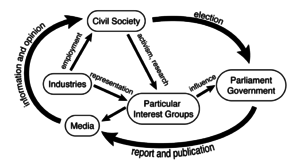Category:Societal Dimension
Contents
Society’s role in the future of energy
The people of Europe – and the world in much broader context – play an essential role for the entirety of the energy market. They are the sole consumers of energy, be it directly with individual energy expenses and travel or indirectly through their source of income being dependent on energy in industry or services alike. In the last few decades, both the price volatility of fuel and sustainability concerns have raised awareness of this topic and charged debate on the future of energy. Consequently, society exerts substantial influence on the way energy is used and researched by means of political representation. This ubiquitous dependence makes a wide support necessary for any shift in Europe’s strategy.
Key Aspects
Besides long-term decisions made by political representation, society has critically discussed and then fundamentally opposed or endorsed developments in the energy sector. The most prominently known clashes between society and the energy sector may be the Anti-Nuclear Movement whose opposition against nuclear weaponry extended to the civil use of nuclear power. Countless radioactive incidents and a few major disasters, most recently at the Fukushima Nuclear Power Plant in Japan in 2011, boosted this opposition. On the contrary, growing awareness of taking responsibility for climate change strongly endorses the development of renewable energy systems. In turn however, the aesthetic effects on original landscapes motivates resistance to the rapid development of wind turbines and associated infrastructure. Both concerns and endorsements are reflected in the political support of renewable energy projects as well as the rigorous planning procedures European countries impose.
Much more subtly however, long-term transformation in the energy sector will challenge society. Decentralised generation will increasingly confront inhabitants with the origins of this formerly invisible commodity, while community projects bear the potential of a more fragmented, but possibly more democratic generation market. Digitisation empowers society to drive the efficiency of energy consumption, at an uncertain cost of adapting lifestyles. If efforts to reduce consumption were driven by prices, less affluent areas would be disproportionately affected. Similarly, transportation and mobility habits are likely to be challenged by a move away from carbon fuels as base energy vector.
Assuming responsibility for changes in climate demands to decrease carbon dioxide emissions greatly in the years to come. Although it was found that it is possible for industrialised countries to show economic growth at stable emission levels, the effects of a continued drive to reduce emissions may put strain on societies highly dependent on energy.
Latest developments in the key areas:
Current policy framework, policy changes, important developments on country, EU, European or international level
Society influences energy policy largely through political representation. In consequence to a long history of national energy policy paradigms, the energy mix in Europe is highly varied. Different scales of subsidies have greatly contributed to an increasing share of renewable energy sources across the continent. This is represented in the highest share of state subsidies across all EU Member States to energy production from renewable energy sources – totalling €41Bn – however, society’s continuing need for energy as a means to generate income is reflected in the €27Bn in subsidies on the demand side such as tax deductions, according to a 2014 report by the European Commission. These two numbers reflect a conflict of interest between creating a more sustainable, less energy-intensive society and the maintenance of living standards. With a new digital economy emerging and maturing, society has created and sought the potential of immaterial goods requiring less energy. These transformational effects seep into nearly all aspects of economy, providing a set of tools to rethink the energy sector.
Further, society’s needs and priorities are very directly communicated through citizen initiatives. Initiatives such as CitizenEnergy, the European platform for citizen investment, or the many other community projects can hardly generate support levels as high as state level. CitizenEnergy quotes investments of € ±1.5M, >6,000 backers and a total of 11.75MW installed capacity, which is on a much smaller scale than state-level policy effects. Nonetheless, an increasing number of such initiatives could become crucial to a more democratic energy market, as advocated by e.g. the European cooperative project “REScoop”.
Key Actors
Central stakeholders acting in the interest of parts of society are political parties, democratic governments and non-governmental organisations such as industry representations or, famously, GreenPeace. These actors cater to present and historic needs of society. Political actors represent the elected part of the civil society, while non-governmental organisations advocate more particular interests of the economy or of activists. To interest parties, media provides a communication channel feeding decisions and trends back into the civil society. By way of publication preferences, media outlets may also become an actor themselves.
A number of intellectuals and researchers attempts to rethink society’s dependency on energy. Notable drafts are the “Post-growth society” advocated prominently by e.g. the Green European Foundation.
Key Questions
- Which forces in society need to be considered when proposing power shifts, particularly those affecting demand?
- How – if at all – can both climate change be mitigated and life standards be maintained?
- How can the burden of transforming the energy sector in Europe be fairly shared among all parts of society?
- How can energy demand and consumption effectively be reduced?
- What role can and should citizens play in the future of the EUʼs energy infrastructure?
Pages in category "Societal Dimension"
The following 20 pages are in this category, out of 20 total.
